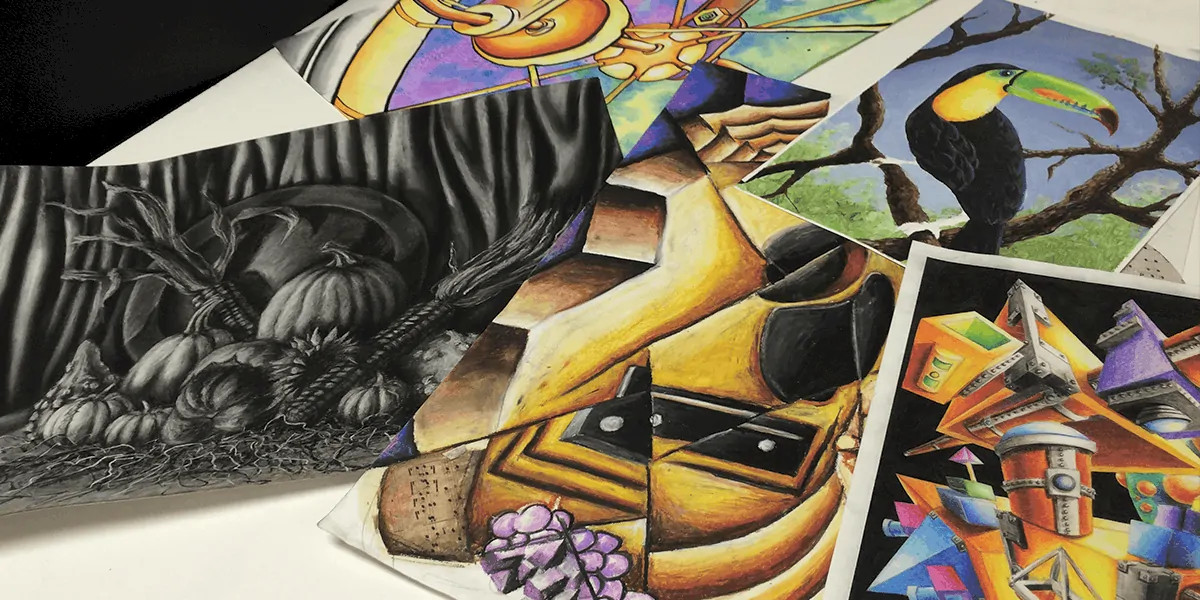Becoming a tattoo artist involves artistic skill, technical knowledge, and dedication, and tattooat.com is here to guide you through every step. Whether you’re drawn to the artistry of custom tattoo designs or fascinated by the rich history of tattooing, this guide will provide essential information. Explore this guide to discover how to turn your passion for body art into a fulfilling career, covering everything from art fundamentals to tattoo licensing and the nuances of the tattoo industry.
1. Understanding The Tattoo Industry
The tattoo industry is experiencing substantial growth, offering exciting opportunities for passionate artists. In 2018, it generated over $1.6 billion in annual revenue, illustrating its strength and popularity. Tattoo artists can earn a comfortable living, with the average salary around $49,520 per year.
Established artists can command impressive rates, sometimes up to $500 per hour, for their skills. This financial potential, coupled with the artistic fulfillment of the work, makes it an appealing career choice for creative individuals. Turning a passion into a profession is a dream for many, and the tattoo industry provides a viable path for those with the talent and dedication.
2. What Are The Different Paths To Becoming A Tattoo Artist?
There are three main routes to becoming a tattoo artist: apprenticeships, self-teaching, and formal education at a state-licensed school. Each path has its advantages and challenges.
- Apprenticeships: Traditionally, aspiring tattoo artists would apprentice under established professionals, a process that could take up to two years.
- Self-Teaching: This involves independent study and practice, which can be a long and challenging road.
- Formal Education: Schools like Florida Tattoo Academy offer structured programs designed to quickly impart the necessary skills and knowledge.
Choosing the right path depends on individual circumstances, learning style, and career goals.
3. Why Is An Apprenticeship A Viable Option To Become A Tattoo Artist?
Apprenticeships were once the most common way to enter the tattoo industry. Aspiring artists would work under the guidance of experienced tattooers, learning the craft over several years.
While apprenticeships offer hands-on experience and mentorship, they can be time-consuming and difficult to secure. Competition for apprenticeships is high, and finding a quality mentor can be challenging. However, the comprehensive training and industry connections gained through an apprenticeship can be invaluable.
4. What Are The Drawbacks Of Self-Teaching To Become A Tattoo Artist?
Self-teaching involves learning through independent study, practice, and experimentation. This approach can be flexible and cost-effective, but it also has significant drawbacks.
Without formal instruction, self-taught artists may develop bad habits or lack a thorough understanding of safety and sanitation protocols. The trial-and-error process can be slow and frustrating, and the absence of expert feedback can hinder progress. While self-teaching can work for highly motivated individuals, it’s not the ideal path for everyone.
5. How Does Formal Education Help You Become A Tattoo Artist?
Formal education at a state-licensed tattoo school offers a structured and accelerated learning experience. Programs like the one at Florida Tattoo Academy aim to equip students with the knowledge and skills needed to start their tattooing careers in a relatively short period.
These programs typically cover art fundamentals, tattooing techniques, safety protocols, and business practices. Students benefit from expert instruction, hands-on practice, and a supportive learning environment. Formal education can provide a solid foundation for a successful career in tattooing.
6. What Skills Do You Need To Become A Tattoo Artist?
Becoming a successful tattoo artist requires a combination of artistic talent, technical skills, and professional attributes. Mastering these areas is essential for providing clients with high-quality, safe, and satisfying tattoo experiences.
6.1. Why Is Artistic Ability Important For Tattoo Artists?
A strong foundation in art is crucial for any aspiring tattoo artist. The ability to draw well is essential for creating original designs and accurately translating clients’ ideas into tattoos.
Artistic skills can be honed through practice, formal art education, or self-study. Understanding composition, color theory, and various artistic styles will enhance your ability to create compelling and visually appealing tattoos.
6.2. What Technical Skills Are Needed To Work A Tattoo Machine?
Operating a tattoo machine requires precision and control. Artists must learn how to adjust the machine settings, control the needle depth, and create clean lines and shading.
Practice is essential for developing proficiency with the tattoo machine. Many schools and apprenticeships provide opportunities to practice on synthetic skin or other materials before working on human clients. Mastering these technical skills is crucial for creating high-quality tattoos.
6.3. Why Is It Important To Maintain And Service Your Tattoo Machine?
Proper maintenance and servicing of tattoo machines are essential for ensuring optimal performance and safety. Artists should learn how to disassemble, clean, and reassemble their machines, as well as how to identify and address any mechanical issues.
Understanding the mechanics of the tattoo machine allows artists to make adjustments and repairs as needed, minimizing downtime and ensuring consistent results. Regular maintenance also helps prevent the spread of infection by keeping the machine clean and sterile.
6.4. What Tattoo Techniques Are Needed To Satisfy Clients?
Clients often request a wide variety of tattoo styles and designs, so artists should be proficient in various techniques. This includes line work, shading, color packing, and blending.
Learning different techniques allows artists to accommodate clients’ diverse preferences and create custom tattoos that meet their specific needs. Staying up-to-date with the latest trends and techniques can also help attract new clients and expand your artistic repertoire.
6.5. Why Is Building A Tattoo Portfolio Important For Success?
A strong portfolio is essential for showcasing your skills and attracting clients or potential employers. The portfolio should include high-quality photos of your best tattoos, demonstrating your range of styles and techniques.
A well-curated portfolio can help you stand out from the competition and demonstrate your artistic abilities to potential clients and employers. It also serves as a valuable tool for tracking your progress and identifying areas for improvement.
 Tattoo artist portfolio showcasing a variety of tattoo styles and designs
Tattoo artist portfolio showcasing a variety of tattoo styles and designs
6.6. How Can Customer Interaction Skills Improve Tattoo Sales?
Effective communication and customer service skills are crucial for building rapport with clients and ensuring a positive tattoo experience. Artists should be able to listen to clients’ ideas, offer suggestions, and address any concerns or questions.
By providing excellent customer service, artists can build a loyal client base and generate positive word-of-mouth referrals. This leads to repeat business and new opportunities.
6.7. Why Is Knowledge Of Bloodborne Pathogens Important?
Understanding bloodborne pathogens and proper sanitation protocols is essential for protecting yourself and your clients from infection. Artists should be knowledgeable about sterilization techniques, cross-contamination prevention, and proper disposal of hazardous waste.
Adhering to strict safety standards is not only ethical but also legally required in many jurisdictions. Completing a bloodborne pathogen training course is often a prerequisite for obtaining a tattoo license.
6.8. What Role Does A Tattoo Shop Play In Your Tattoo Career?
Landing a job at a reputable tattoo shop can provide valuable experience, mentorship, and exposure to a wider client base. Shops often have established reputations and marketing systems, which can help artists build their careers more quickly.
However, finding the right shop can be challenging, as many owners are hesitant to hire inexperienced artists. Building a strong portfolio and networking with shop owners can increase your chances of securing a position.
7. How Can Tattooat.Com Help Me Find Inspiration And Resources?
Tattooat.com offers a wealth of resources and inspiration for aspiring tattoo artists. You can explore a vast gallery of tattoo designs, discover talented artists and studios, and access informative articles on tattooing techniques, safety protocols, and industry trends. Tattooat.com serves as a valuable hub for anyone passionate about tattooing.
8. What Are Some Frequently Asked Questions About Becoming A Tattoo Artist?
8.1. What Exactly Does A Tattoo Artist Do?
A tattoo artist creates permanent designs on people’s skin using ink and needles, blending artistry with technical skill.
8.2. What Are The Steps To Becoming A Tattoo Artist?
The journey involves honing your art skills, mastering tattoo design, building a strong portfolio, choosing a learning path (apprenticeship or school), and obtaining the necessary tattooing license.
8.3. Is A Special License Required To Be A Tattoo Artist?
Yes, most jurisdictions require a tattooing license to ensure safety and compliance with health standards.
8.4. How Long Does It Take To Get A Tattoo License?
The duration varies by location, typically involving completing a training program or apprenticeship.
8.5. What Should I Study In School For A Tattoo Artist Career?
Focus on fine art, color theory, and design to build a strong artistic foundation.
8.6. Is College Or Art School Necessary To Become A Tattoo Artist?
While helpful, formal education is not mandatory; skill, dedication, and a strong portfolio are more critical.
8.7. What Elements Should Be Included In My Portfolio?
Include your best drawings, designs, and photos of completed tattoos to showcase your skills.
8.8. How Important Is Regular Drawing Practice?
Consistent practice is essential for improving your skills and developing your unique style.
8.9. Can I Succeed As A Tattoo Artist If I’m Not A Great Artist?
While challenging, dedication and practice can significantly improve your artistic abilities.
8.10. Are There Various Paths To Becoming A Tattoo Artist?
Yes, options include art schools, apprenticeships, and self-study, each offering unique benefits.
9. Why Should I Choose Florida Tattoo Academy?
Florida Tattoo Academy is dedicated to excellence, focusing on foundational skills beyond just licensing. Our mission is to cultivate a deep understanding of a sterile work environment for client safety.
Founded and run by experienced artists, we help students turn their artistry into successful careers. The comprehensive curriculum covers tattoo history, advanced shading, and business management, preparing graduates to excel as professional tattoo artists. Our goal is to ensure you are ready to apply for a job or start your own business upon graduation.
We pride ourselves on preventing bad habits and ensuring you become the best tattoo artist possible. Florida Tattoo Academy lays the foundation for you to win awards and be featured in tattoo magazines.
10. Ready To Start Your Journey To Becoming A Tattoo Artist?
If you’re ready to take the first step toward a fulfilling career as a tattoo artist, tattooat.com is here to support you.
10.1. Find Inspiration
Explore our extensive gallery of tattoo designs to spark your creativity and discover new styles.
10.2. Connect With Artists
Browse our directory of talented tattoo artists and studios to find mentors, collaborators, or potential employers.
10.3. Expand Your Knowledge
Read our informative articles and guides to learn about tattooing techniques, safety protocols, and industry trends.
Visit tattooat.com today and unlock your potential as a tattoo artist.
Address: 1825 SW Broadway, Portland, OR 97201, United States
Phone: +1 (503) 725-3000
Website: tattooat.com
